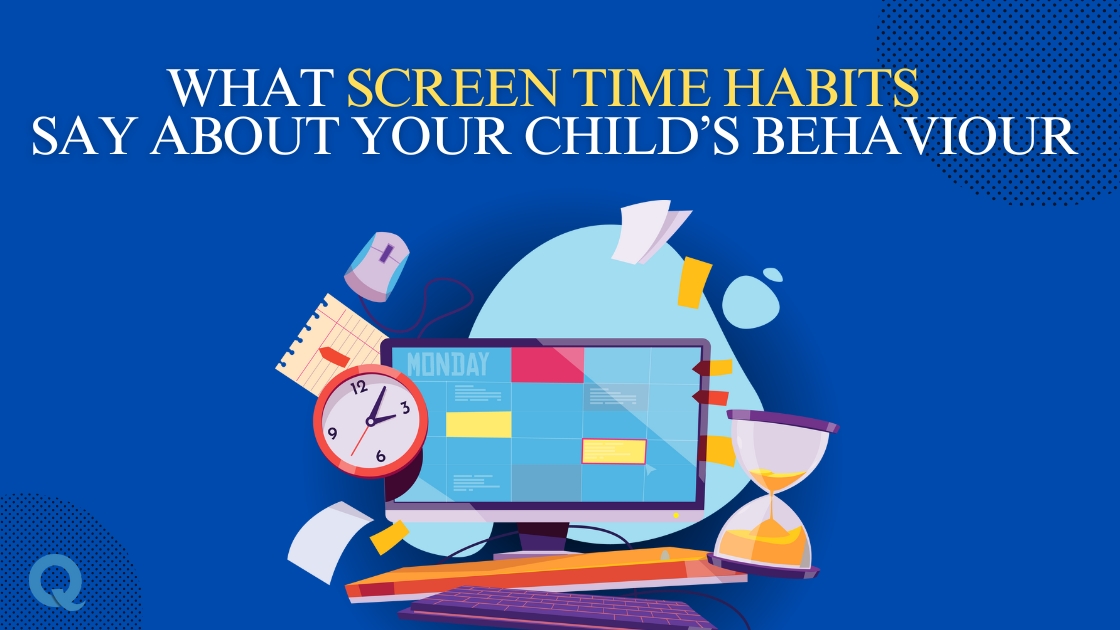
You’ve probably seen your child sitting in front of a screen, completely glued to it. Maybe it’s a tablet, a phone, or the TV. And you might be wondering, what does this really say about my child? Is it bad? Is it normal? Don’t worry, you’re not alone. Every parent today is asking the same thing.
Let’s walk through it together simply, clearly, and without any complicated talk. This is not about blaming screens or pointing fingers. It’s about understanding your child better, so you can help them grow happy and healthy.
What Is Screen Time, Really?
Screen time just means how much time your child spends in front of a screen. This could be watching cartoons, playing games, using apps, or even doing schoolwork online. It’s part of life now and not all of it is bad!
Some screen time can actually be fun, helpful, and even educational. But when it gets too much, or when it becomes the only thing your child wants to do, that’s when it might start affecting their behaviour.
How Much Time Is Too Much?
There’s no perfect number for “good” or “bad” screen time. But if your child is always on a screen, morning to night, and they get upset when you ask them to stop that’s a red flag.
Look out for these signs:
- They blow up when you take the screen away
- They don’t want to go outside or play anymore
- They can’t fall asleep easily
- They seem moody or easily annoyed after screen time
These signs don’t mean something is “wrong” with your child. It just means their screen habits might need a little change. And guess what? You’re the best person to help them do that?
What Screen Habits Can Tell You
Believe it or not, screen habits can tell you a lot about how your child is feeling.
Let’s say your child always turns to a screen when they’re sad or upset. That could mean they’re using it to escape their feelings. If they get lost in games and don’t want to stop, maybe they’re feeling bored or stressed.
On the other hand, if your child loves learning apps or making art on the tablet, that shows creativity and curiosity. Not all screen time is bad it’s the reason why they’re using it that matters.
How Screens Can Affect Behaviour
Spending too much time in front of a screen can affect more than just your child’s eyes. It can change how they act, feel, and even think.
Here’s how:
- Sleep problems: Bright screens can trick the brain into thinking it’s still daytime, making it hard to fall asleep.
- Mood swings: Some kids become more angry or sad after long hours of screen time.
- Less focus: Switching quickly from videos to games to apps can make it harder for your child to concentrate on real-life things.
- Less social time: If your child spends more time with screens than with people, they might struggle with talking or sharing feelings.
It doesn’t happen overnight. But little by little, these habits can shape your child’s behaviour good or bad.
You’re Habits Matter Too
Kids copy what they see. If you’re always on your phone, they’ll want to be too. If you enjoy screen-free time, like reading, walking, or talking with them. They’ll learn to enjoy that as well.
You don’t have to be perfect. Just try small things like:
- Putting your phone away during meals
- Watching a show with your child instead of using screens separately
- Saying, “Let’s take a break together,” instead of just telling them to stop
When your child sees you making an effort, they’ll follow your lead.
Easy Ways to Build Better Screen Habits
You don’t need to cancel all screens. Just make small changes, together. Here are some simple ideas:
- Create a “screen schedule” so your child knows when it’s time for screens and when it’s not
- Try “screen-free zones” like bedrooms or during meals
- Offer fun alternatives like board games, drawing, or just going outside
- Talk about what they watch ask questions like “What did you like about that video?” or “Would you like to try that in real life?”
Kids love feeling included. If you talk with them about screen rules instead of just making strict rules, they’ll be more likely to listen.
When It Might Be Time for Help
If your child becomes really upset every time the screen is turned off, or if their mood or sleep changes a lot, it might be time to look for support. That doesn’t mean something is wrong with your parenting. It just means you care enough to notice.
Sometimes, even simple tools can make life easier.
That’s where something like qoli.ai comes in a smart parental control app that helps you guide your child’s screen time without stress. It sets limits for you, so you don’t have to argue about screen time every day. It’s like having a helpful partner who never gets tired.
You Don’t Have to Be Perfect Just Present
At the end of the day, this isn’t about getting rid of screens. It’s about learning what your child’s screen habits are really saying. Are they bored? Lonely? Curious? Trying to escape something? Or just enjoying a game?
Your job isn’t to control every moment. It’s just to be there, to notice, and to help when needed.
Start small. Watch with them. Talk to them. Play with them. Set gentle limits. You’ll be amazed how much those little steps can shape not just their screen habits but their whole behaviour, too.









